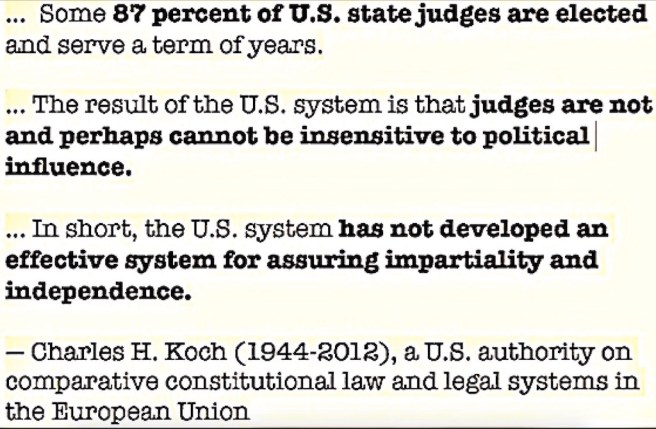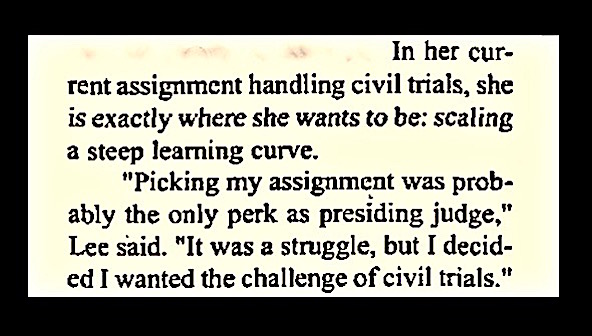
…
Part 2 can be read here
…
Would-be judges in the rest of the world have to stay out of politics, but the U.S. constitution makes judicial officers electable through election campaigns that can be stunningly dull or ferociously contentious. In next month’s state elections in California, four public defenders — lawyers who represent poor people accused of committing crimes, at the taxpayers’ expense — are hoping to win enough votes to replace four San Francisco judges. They are being castigated for doing this.
Here are some questions about a mystifying opinion piece that ran in The San Francisco Examiner on 2 May 2018, headlined ‘Election threatens San Francisco judiciary’. Let’s be perfectly clear. That header is not a reference to any accusation of illegal or antisocial behaviour by the public defenders in the election, but to the fact that there are any contests at all for judicial positions. It is as strange as if an American were criticising fellow-Americans for ignoring the rules of cricket in playing football — even though everyone knows that cricket is not and never was America’s game.
Yet the piece is only one of several op-eds on the same theme in the run-up to the 5 June state election — many of them written by senior judges and politicians.
Examiner readers’ comments beneath the opinion essay of Amy Bacharach — a psychologist specialising in juvenile justice — suggest that Americans are as confused as any outsider by how their legal system works and ensures impartiality. Their remarks underline the urgent, dire need to make court proceedings open, transparent, and debatable by the public.
Until there are answers to the questions in this blog post — arranged as a virtual conversation with Ms. Bacharach — there is no saying how such a revolution is going to happen. The queries are linked to facts on record about the San Francisco case to which this site is dedicated
Amy Bacharach (AB): ‘The process of running against sitting judges defies judicial ethics in the first place … … The U.S. is alone in electing its judges, which puts judges in a role of politician. […] Overwhelming evidence suggests it’s dangerous to start playing politics with the judiciary.’
COTIN: ‘Defies’? ‘Start playing politics’? Surely those cannot be the right words. Until someone rewrites the California constitution so that judges no longer have to run for election every six years to retain their seats, how can these accusations against the four public defenders make sense?
At least one of the four judges being challenged in this election — Cynthia Ming-Mei Lee in seat #9 on the San Francisco bench — campaigned for a senior judicial post herself in 2012. An internal poll, the first contested election in the court’s history, made her the presiding justice.
Nor is this judge above open political affiliation. According to The San Francisco Examiner, she ‘registered as a Democrat after this election began, [and] previously listed no party preference, though she was a registered Republican in the 1990s.’
AB: ‘To be clear, the incumbent judges have no ethical concerns and have done their jobs diligently … … To be sure, the attorneys running for judge in San Francisco would likely make excellent judges, just as those currently serving are excellent judges.’
COTIN: How could anyone know any of that for a fact, when the state judiciary is notoriously so secretive about how it operates?
Only last December, an editorial in The San Francisco Chronicle said:
California’s courtrooms may be open to the public, but there’s no openness when it comes to disciplinary complaints against judges. The Commission on Judicial Performance insists that its oversight work be kept secret and untouchable.
It’s an indefensible stance, but it’s working so far. A state-ordered audit is seeking a look at the commission’s private world, but the judicial agency won a first-round victory — from a judge, no less — in blocking the outside inquiry. [The state Auditor has appealed against that decision.]
Elsewhere, the public defenders galvanising this election have been condemned for trying to unseat ‘experienced’ judges. The incumbents have unquestionably earned that label in some branch of law — but can still lack fundamental experience in others, with deadly consequences for litigants appearing before them.
Six years ago, after a long career as a specialist in criminal law, Judge Cynthia Ming-Mei Lee decided to preside over civil cases. In 2015, the year she turned 66, she herself testified to the difficulty she was having acquiring the necessary expertise, as a clip from a profile in a legal newspaper, The Daily Journal, shows (below).

The knowledge and principles behind civil and criminal law are profoundly different. As one legal reference site explains: ‘The standard of proof is also very different in a criminal case versus a civil case. Crimes must generally be proved “beyond a reasonable doubt”, whereas civil cases are proved by lower standards of proof such as “the preponderance of the evidence” (which essentially means that it was more likely than not that something occurred in a certain way).’
Nearly a year after Judge Ming-Mei Lee decided the case examined on this site — which required expertise at the junction of family and contract law — it was clear that she lacked any of the necessary background. This can feel like a tree surgeon appearing in scrubs beside your operating table, as the anaesthetic begins to take effect, with consequences as disastrous as you might expect.
AB: … ‘Finally, judicial elections are often so low on the public’s radar that, as one writer noted, they provide the illusion of popular control at the expense of actual accountability.’
COTIN: Everyone who knows anything about California courts agrees that demanding accountability — with transparency — should be the highest priority of California voters who care about their legal system.
Surely the four public defenders in this election are performing an even more valuable public service than in their jobs, by forcing Californians to stop being oblivious and start paying close attention to what is happening in their legal system?
That is an objective perfectly in line with the mission of this site, and trends far across the world.
…
Recommended further reading at 48hills.org:
A challenge to sitting judges — and the secretive judicial system
…
** ‘The Advantages of the Civil Law Judicial Design as the Model for Emerging Legal Systems’, Charles H. Koch Jr., Indiana Journal of Global Legal Studies, 2004.
…
Part 2 of this series of posts on COTIN can be read here
One thought on “What would a Martian make of the 2018 judges’ election in San Francisco — in which candidates are being scolded and lambasted for running at all?”